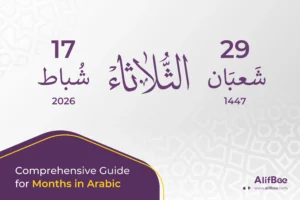Arabic Proverbs on Justice
Justice is a core value that holds communities together and ensures fairness for everyone. As you learn Arabic, exploring its proverbs offers a glimpse into the cultural values that matter deeply in the Arabic-speaking world.
In this post, we’ll look at 5 powerful Arabic proverbs on justice. These timeless sayings will add depth to your Arabic vocabulary and inspire you to champion fairness and equality in your own life.
Proverb 1: كَما تُدينُ تُدانُ
What goes around comes around
Kamā tudynu tudānu
The phrase literally means “As you judge, so you will be judged.” In other words, the way you treat others is how you, in turn, will be treated.
In Arabic-speaking cultures, this proverb is often used to remind people of the importance of justice and to reinforce moral behavior. It reflects a shared cultural value that fairness and righteousness are rewarded, while wrongdoing is ultimately punished.
Proverb 2: الجَزاءُ مِن جِنسِ العَمَل
You reap what you sow
Aljazāʼu min jinsi alʻamal
The Arabic proverb “الجزاء من جنس العمل” (pronounced al-jazāʾ min jins al-ʿamal) translates to “You reap what you sow.” This saying is rooted in the idea of direct consequences for one’s actions, whether positive or negative.
The phrase means “The reward is of the same type as the action.” In other words, the outcome or reward reflects the nature of the actions taken. This proverb emphasizes personal responsibility and accountability, suggesting that actions have corresponding consequences.
Proverb 3: العَدلُ أَساسُ المُلك
Justice is the foundation of good governance
Alʻadlu asāsu almulk
The Arabic proverb “العدل أساس المُلك” (pronounced al-ʿadl asās al-mulk) translates to “Justice is the foundation of good governance” or “Justice is the foundation of rule.” This saying highlights the idea that fair and just governance is essential for the stability and longevity of leadership or authority.
It is often used to remind leaders and those in authority that their actions should be guided by principles of fairness to maintain harmony and respect within society.
Proverb 4: السَّاكِتُ عَنِ الحَقِّ شَيطانٌ أَخرَسٌ
Silence in the face of evil is itself evil.
Alssākitu ʻani alḥaqqi shayṭānun akhrasun
The Arabic proverb “السّاكتُ عن الحقِّ شيطانٌ أخرسٌ” (pronounced al-sākit ʿan al-ḥaqq shayṭān akhras) translates to “Silence in the face of evil is itself evil,” or more literally, “He who remains silent about the truth is a mute devil.” This saying emphasizes the moral responsibility to speak out against wrongdoing and to uphold truth and justice.
Proverb 5: سُلطانٌ بِلا عَدلٍ كَالنّهرِ بلا ماء
A ruler without justice is like a land without water
Sulṭānun bilā ʻadlin kālnnhri bi-lā Māʼ
This Arabic proverb literally translates to “A sultan ruling without justice is like a river without water”. This proverb paints a vivid image of the dire consequences that come from a lack of justice. Just as a land without water is barren and lifeless, a ruler who governs without justice creates a desolate and unhappy society. This saying serves as a reminder of the vital role that justice plays in the well-being and prosperity of a nation.
Final word
These five Arabic proverbs on justice highlight the importance of fairness and integrity in our lives and communities. As you learn Arabic, think about the wisdom in these sayings and how you can apply their lessons.
By choosing justice and fairness, we each play a part in building a more peaceful and just world.
Download AlifBee app to learn Arabic from the basics to advanced levels all with fun exercises and well-designed content.








